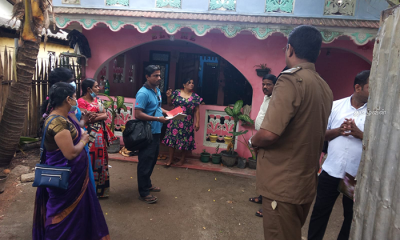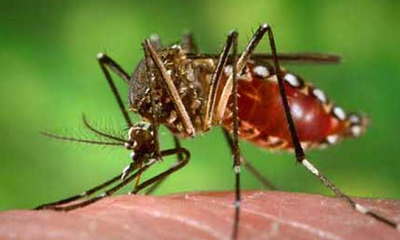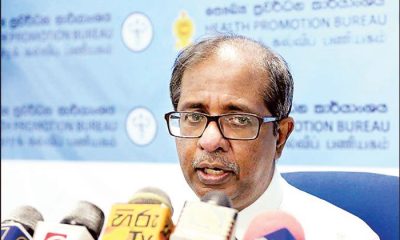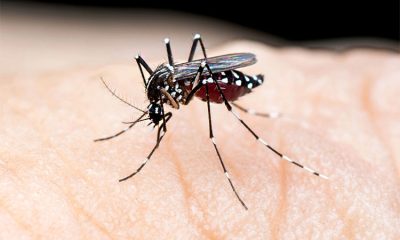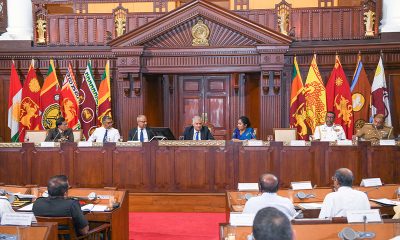News
Treatments for dengue: a Global Dengue Alliance to address unmet needs
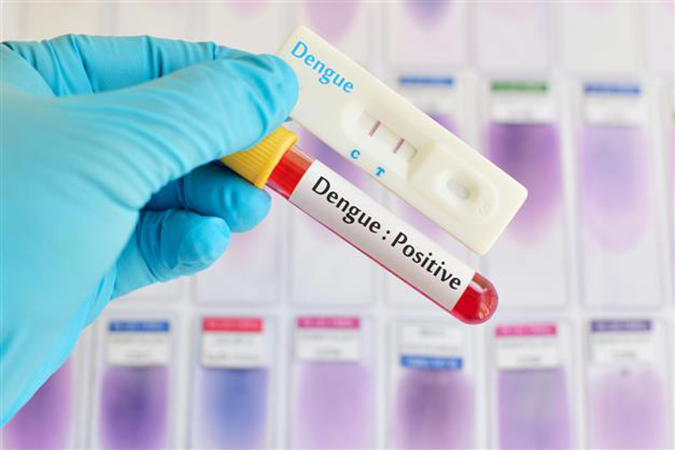
The importance of developing a treatment for dengue has largely been ignored, the Dengue Alliance said in a statement.However, a recently formed Global Dengue Alliance with several institutions in dengue-endemic countries, plans to accelerate research and development and deliver dengue therapeutics through an inclusive partnership.
Formation of this alliance is a major step towards developing a treatment for dengue, by aggregating resources from endemic countries, and ensuring engagement, scientific leadership, clinical guidance, and political interest in these countries.
Dengue is currently the most rapidly spreading mosquito-borne viral infection in the world, with half of the world’s population at risk of becoming infected. As a result of climate change, rapid urbanisation, and widespread international travel, the incidence of dengue is rapidly increasing, overwhelming healthcare systems in many lower-income countries. Climate change has increased the burden of dengue in endemic countries and has also led to expansion of this infection to new territories in Europe and North America.
Dengue is estimated to infect approximately 390 million individuals annually, with 96 million infections being symptomatic. So far, the only strategy adopted to reduce the burden of dengue is vector control. Although techniques such as using Wolbachia bacteria to reduce dengue transmission by Aedes mosquitoes look promising, it is evident that vector control alone is unlikely to be adequate to reduce the burden of dengue.
The currently available dengue vaccines (CYD-TDV and TAK-003) have been shown to reduce hospitalisations, especially in dengue-seropositive individuals, but lack efficacy against some dengue virus serotypes. Furthermore, CYD-TDV showed a higher incidence of severe dengue in dengue-naive vaccine recipients, and both vaccines show some degree of waning immunity with time, especially in seronegative individuals. Therefore, an integrated approach that comprises vector control, use of safe and effective vaccines, and an effective treatment is needed to face the growing challenges of dengue infection.
Efforts focused on finding a treatment have been scarce, with some investigator-led clinical trials conducted, and a few performed by pharmaceutical companies. The importance of developing a treatment for dengue has largely been ignored. The Drugs for Neglected Diseases initiative, which is focused on finding novel affordable treatment solutions for neglected tropical diseases since its inception in 2003, has recently formed a Global Dengue Alliance with several institutions in dengue-endemic countries, including the Faculty of Medicine at Siriraj Hospital, Mahidol University in Thailand; the Ministry of Health in Malaysia; the Translational Health Science and Technology Institute in India; the Oswaldo Cruz Foundation in Brazil; and the Federal University of Minas Gerais in Brazil. The mission of this alliance is to accelerate research and development and deliver dengue therapeutics through an inclusive partnership.
It aims to deliver a new treatment for dengue, within five years, from repurposed drugs and combinations (including novel antivirals from pharmaceutical companies). This alliance is co-created, co-owned, and co-funded by dengue-endemic countries, with a tiered governance mechanism allowing collaborative decision making at different levels. The organisations have formed a preclinical working group, a clinical working group, and a translational working group for effective communication and scientific planning.
All three working groups feed into the Joint Steering Committee, which is responsible for delivering on the vision and mission of the alliance. The partners of this alliance share knowledge, experience, technologies, and capabilities to jointly validate preclinical assays with the ambition in the initial phase to identify currently available drugs that can be repurposed for use as dengue therapeutics. In parallel, clinical trials for these drug candidates are being designed using the expertise of clinicians in these countries who have been treating patients with dengue for many years, with initiation planned by the end of 2023.
Formation of this alliance is a major step towards developing a treatment for dengue, by aggregating resources from endemic countries, and ensuring engagement, scientific leadership, clinical guidance, and political interest in these countries.
The different working groups and the steering committee coordinate efforts to address gaps in knowledge, such as epidemiology (specifically in Africa), biomarkers and diagnostics, clinical trials, and regulatory framework, while promoting open science. Although currently the alliance has a small number of partners, it is open to collaborations with new partners and key stakeholders in therapeutics and diagnostics.
Working with and aligning many partners and stakeholders to deliver objectives in a new model of collaboration is challenging, as is filling the existing knowledge gaps and need for integration, and leveraging information from different geographies and epidemiological settings. Furthermore, doing clinical trials aimed at treating dengue disease is challenging due to the seasonal nature of the disease, and with climate change, disease patterns could become more unpredictable.
Although this approach is likely to accelerate development of a treatment, funding remains a challenge. With climate change becoming more of a concern in high-income countries, there is an increasing possibility that many global funding organisations will acknowledge the true burden of dengue, the devastation it causes to health systems and patients in endemic countries, and, therefore, the importance of funding initiatives to accelerate the development of new treatments for dengue.
News
US sports envoys to Lanka to champion youth development

The U.S. Embassy in Colombo welcomed the U.S. Sports Envoys to Sri Lanka, former National Basketball Association (NBA) and Women’s National Basketball Association (WNBA) players Stephen Howard and Astou Ndiaye, from June 8 through 14.
The Public Diplomacy section of the U.S. Embassy said that it would launch a weeklong basketball program intended to harness the unifying power of sports, made possible through collaboration with Foundation of Goodness and IImpact Hoop Lab.
While in Sri Lanka, Howard and Ndiaye, both retired professional basketball players, will conduct a weeklong program, Hoops for Hope: Bridging Borders through Basketball. The Sports Envoys will lead basketball clinics and exhibition matches and engage in leadership sessions in Colombo and Southern Province for youth aged 14-18 from Northern, Uva, Eastern and Western Provinces, offering skills and leadership training both on and off the court. The U.S. Envoys will also share their expertise with the Sri Lanka Basketball Federation, national coaches, and players, furthering the development of basketball in the country. Beyond the clinics, they will collaborate with Sri Lankan schoolchildren to take part in a community service project in the Colombo area.
“We are so proud to welcome Stephen and Astou as our Sports Envoys to Sri Lanka, to build on the strong people-to-people connections between the United States and Sri Lanka,” said U.S. Ambassador Julie Chung. “The lessons that will be shared by our Sports Envoys – communication, teamwork, resilience, inclusion, and conflict resolution – are essential for leadership development, community building, equality, and peace. The U.S. Sports Envoy program is a testament to our belief that sports can be a powerful tool in promoting peace and unity.”
News
Rahuman questions sudden cancellation of leave of CEB employees

SJB Colombo District MP Mujibur Rahuman in parliament demanded to know from the government the reasons for CEB suspending the leave of all its employees until further notice from Thursday.
MP Rahuman said that the CEB has got an acting General Manager anew and the latter yesterday morning issued a circular suspending leave of all CEB employees with immediate effect until further notice.
“We demand that Minister Kanchana Wijesekera should explain this to the House. This circular was issued while this debate on the new Electricity Amendment Bill was pending. There are many who oppose this Bill. The Minister must tell parliament the reason for the urge to cancel the leave of CEB employees,” the MP said.However, Speaker Mahinda Yapa Abeywardena prevented Minister Wijesekera responding to the query and said that the matter raised by MP Rahuman was not relevant.
News
CIPM successfully concludes 8th Annual Symposium

The Chartered Institute of Personnel Management (CIPM) successfully concluded the 8th Annual CIPM Symposium, which took place on 31st May 2024. Themed “Nurturing the Human Element—Redefining HRM in a Rapidly Changing World,” the symposium underscored the pivotal role of human resource management (HRM) in today’s dynamic global landscape. Since its inception in 1959, CIPM has been dedicated to advancing the HR profession through education, professional development, and advocacy, solidifying its position as Sri Lanka’s leading professional body for HRM.
Ken Vijayakumar, the President of the CIPM, graced the occasion as the chief guest. The symposium commenced with the welcome address by the Chairperson, Prof. Arosha Adikaram, followed by the Web Launch of the Symposium Proceedings and Abstract Book by the CIPM President. The event featured distinguished addresses, including a speech by Chief Guest Ken Vijayakumar, President of CIPM, and an address by Guest of Honor Shakthi Ranatunga, Chief Operating Officer of MAS Holdings Pvt. Ltd., Sri Lanka.
The symposium also featured an inspiring keynote address by Prof. Mario Fernando, Professor of Management and Director of the Centre for Cross Cultural Management (CCCM) at the University of Wollongong, Australia.
Vote of Thanks of the inauguration session was delivered by Dr. Dillanjani Weeratunga, Symposium Co-chair.
The symposium served as a comprehensive platform for researchers to present their findings across a wide range of critical topics in HRM. These included Cultural Diversity and Inclusion, Talent Development and Retention, Ethical Leadership and Corporate Social Responsibility, Adapting to Technological Advancements, Mental Health and Well-being at Work, Global Workforce Challenges, Employee Empowerment, and Reskilling and Upskilling.
The plenary session was led by Prof. Wasantha Rajapakse. Certificates were awarded to the best paper presenters during the valedictory session, followed by a vote of thanks delivered by Kamani Perera, Manager of Research and Development.
The annual symposium of CIPM was a truly inclusive event, attracting a diverse audience that spanned undergraduates, graduates, working professionals, research scholars and lecturers. This widespread interest highlights the symposium’s significance in the field of HRM, offering a unique opportunity for everyone to network and learn from scholarly brains.The CIPM International Research Symposium was sponsored by Hambantota International Port, Sri Lanka Institute of Information Technology (SLIIT), E B Creasy & Co. PLC, and Print Xcel Company.


